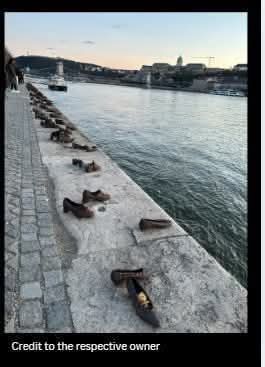In the winter of 1944, the streets of Budapest became a corridor of death. Jews were forced to march to the banks of the Danube, stripped of their shoes—the most precious possession in wartime—and lined up before the frozen river. Arrow Cross Party soldiers aimed their rifles and fired first, sending bodies into the icy waters. The shoes were left behind, empty and silent witnesses to the horror.
This brutal act had a grimly practical purpose: shoes were scarce and costly during the war. The executioners collected them to sell or use, while the families disappeared beneath the dark waters. Each pair of shoes stood for a life brutally ended, a story stolen in a moment of violence.
Today, a touching memorial stands on that same riverbank: sixty iron shoes, worn and arranged along the edge. There are no names or dates—just the quiet of empty shoes speaking for thousands of lost voices. Each pair reflects the life of a worker, an elegant woman, or a child. Though the Danube continues to flow, its waters can no longer wash away the memory. The iron shoes remind the world that humanity once came dangerously close to losing itself completely.